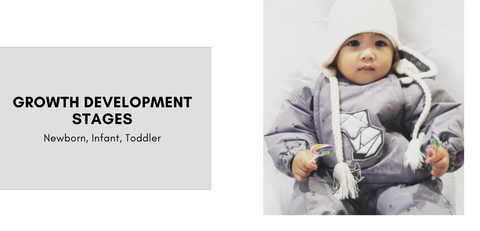
What’s the Difference Between a Baby, Newborn, Infant, & Toddler?
Share
Many people often use different terms to refer to a neonate or a child under 4 years of age. That could confuse many people about the actual meaning of each term including baby, newborn, infant, or toddler.
So, if you wonder what is the main difference between all these terms?
Then, the answer is pretty simple. The baby is a general word that is used for tots under 4 years of age. Whereas, the newborn refers to a baby of 0 to 2 months.
The kids of 2 to 12 months are considered infants. Usually, the infant term can also be used for newborns. And the ones over 1 year to 4 years old are called toddlers.
The story does not end yet, you also need to understand the initial growth stages of your baby as these early years of a child are very crucial. Their body undergoes rapid development and requires special care.
Therefore, you have to be very considerate towards your baby. Learn the different development stages of your infant and his evolving requirements.
Moreover, you should choose the right clothing for your little one according to changing seasons to calm your fussy babies.
For instance, in winter, you can use the best Conifer infant and toddler snowsuits, or for spring, the finest quality boys spring sets and girls softshell jackets would be perfect for your babies to keep them comfy and happy.
Now, let’s see the three different growth stages your baby will go through and what they develop over that period.
Growth Development Stages of a Baby
Newborn (0 to 2 months)
In this stage, the babies stabilize their vision, communicate their feelings through facial expressions, or change their sounds.
They explore their body parts especially their hands and toes. Meanwhile, they also begin developing an affectionate bond with their parents. So, you should hold, play, and cuddle with your newborn as much as you can.
Nutritional Requirements: Newborns must be breastfed and given an appropriate baby formula that provides an adequate amount of fats, proteins, carbs, vitamins, and minerals.
Infant (0 to 12 months)
The babies learn to use their body parts for clapping, grabbing things, crawling, or even walking. By this stage, they also recognize their family or relatives and start responding to their names.
During this period, the child needs proper nutritional values to develop better health and stronger bones.
Nutritional Requirements: During infancy, more minerals and vitamins should be added to the baby’s diet in addition to excessive breastfeeding. These nutrients are zinc, protein, iron, calcium, fat, folate, and carbohydrates.
Toddlers (1 to 4 years)
It is the last stage of babyhood when a tot starts uttering the names or words that you frequently use with them, or taking small steps on their own. During this stage, the toddlers develop essential cognitive skills and gain a healthy weight of about 24 to 28 lbs.
Nutritional Requirements: The nutrients will remain the same. Albeit, you can increase the number of carbs to 1,000 to 14,000 a day and start introducing fruits and vegetables to the exploratory tastebuds of your budding child. This will also help them to develop new tastes over these three years.

